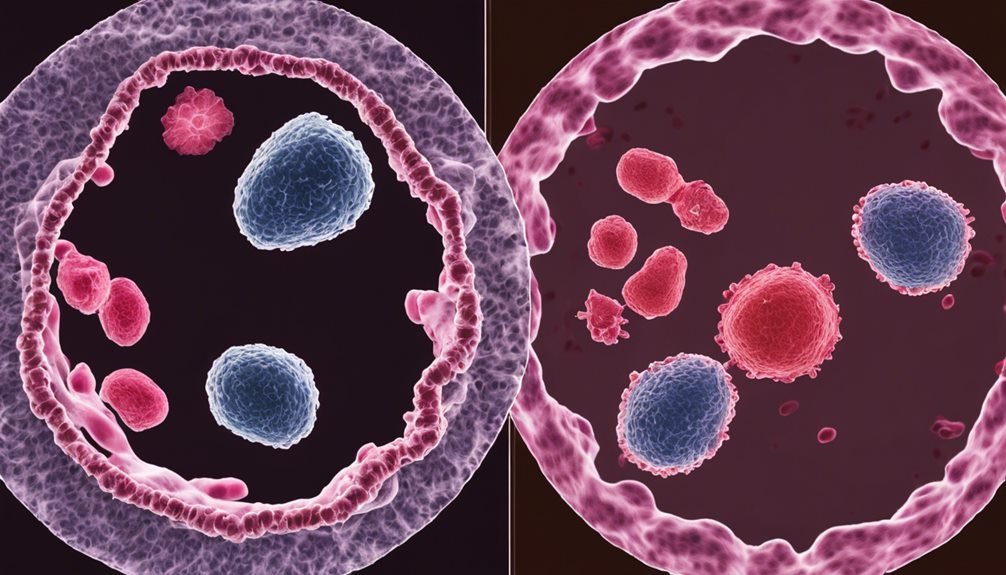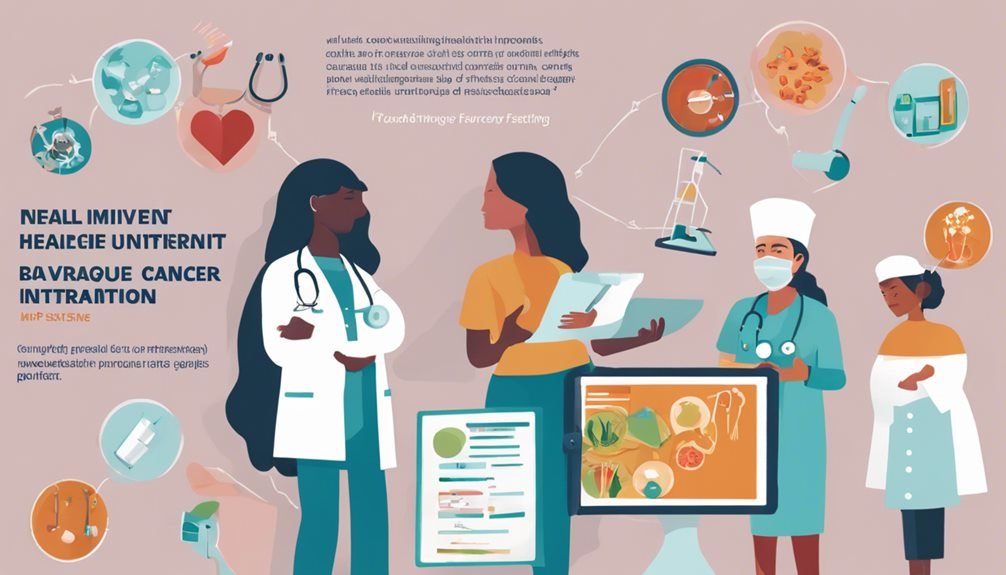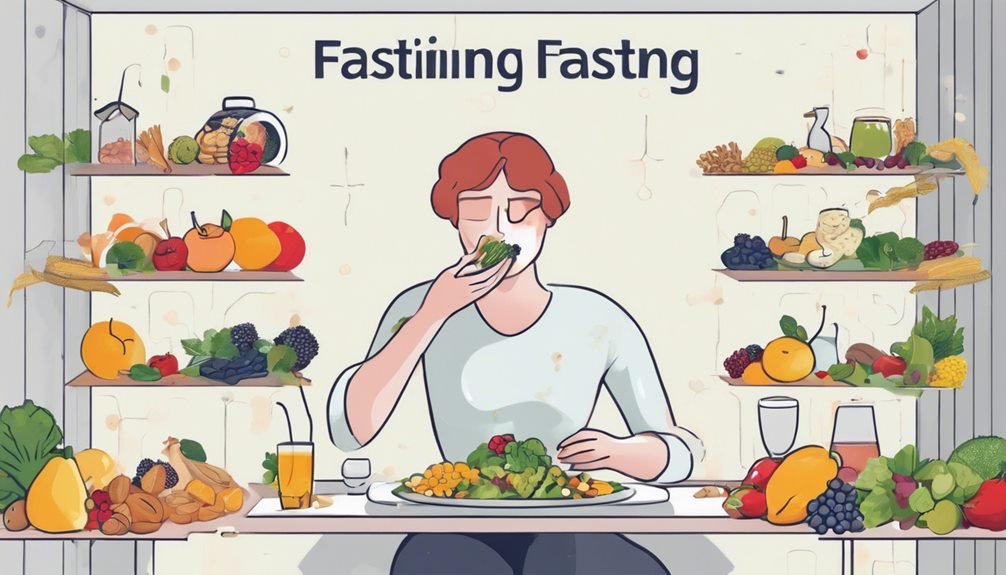You've heard about the potential benefits of intermittent fasting in cancer management, but can it truly help cure cancer? The evidence suggests that intermittent fasting may hold promise in influencing cancer cells and treatment outcomes, but the full extent of its impact remains to be fully understood. As you explore the connection between fasting and cancer, consider the various mechanisms at play and how personalized fasting approaches could shape the future of cancer treatment.
Key Takeaways
- Intermittent fasting can aid in cancer treatment by enhancing therapy efficacy.
- Fasting promotes cancer cell death and inhibits growth through metabolic alterations.
- Combining fasting with traditional treatments shows synergistic effects in cancer management.
- Fasting reduces inflammation, protecting healthy cells and enhancing immune responses against cancer.
- Personalized fasting protocols, guided by healthcare providers, optimize cancer treatment outcomes.
Understanding Intermittent Fasting
Intermittent fasting is a dietary approach that involves cycling between periods of eating and fasting. This method has gained attention for its potential health benefits, including cancer prevention. Fasting benefits extend beyond weight management; they may also play a role in reducing the risk of cancer. Studies have shown that fasting can help regulate blood sugar levels, reduce inflammation, and improve overall cellular health, all of which are factors that can contribute to cancer prevention.
By incorporating intermittent fasting into your routine, you may be able to support your body in its natural defense mechanisms against cancer. Fasting triggers various cellular processes that can enhance the body's ability to repair damaged DNA, which is crucial in preventing the development of cancerous cells.
Additionally, fasting has been linked to a reduction in insulin resistance and inflammation, both of which are factors that can promote cancer growth.
Incorporating intermittent fasting into your lifestyle may offer a proactive approach to safeguarding your health and reducing the risk of developing cancer.
The Link Between Fasting and Cancer
Research has revealed a compelling relationship between fasting and cancer, shedding light on how periodic abstaining from food could influence cancer development and progression. Fasting benefits have been shown to potentially aid in cancer prevention by promoting cellular repair mechanisms and reducing inflammation.
When you fast, your body enters a state of metabolic stress, prompting cells to adapt and become more resilient. This adaptive response can help protect healthy cells from DNA damage and mutations that could lead to cancer formation. Additionally, fasting may enhance the immune system's ability to detect and destroy cancerous cells, further contributing to cancer prevention.
Effects on Cancer Cells

The impact of fasting on cancer cells is a topic of increasing interest and research within the scientific community. Studies have shown that intermittent fasting can have profound effects on cancer cells, particularly in terms of promoting cell apoptosis and inhibiting tumor growth.
| Effects of Fasting on Cancer Cells |
|---|
| Cell Apoptosis |
| Fasting has been associated with triggering programmed cell death (apoptosis) in cancer cells, leading to their destruction. This process helps in reducing the size and spread of tumors. |
| Tumor Growth |
| Intermittent fasting has shown to slow down the rate of tumor growth by disrupting the metabolic processes that cancer cells rely on for their rapid proliferation. This can potentially make cancer cells more vulnerable to treatments. |
Understanding how fasting influences cell apoptosis and suppresses tumor growth is crucial in exploring the therapeutic potential of intermittent fasting for cancer treatment. Further research is needed to delve deeper into these mechanisms and their clinical implications.
Potential Mechanisms of Action
Building on the observed effects of intermittent fasting on cancer cells, understanding the potential mechanisms of action behind these outcomes is imperative for unlocking the therapeutic promise of this dietary approach.
When considering how intermittent fasting may impact cancer, two key mechanisms come into play:
- Metabolic Regulation: Intermittent fasting can lead to alterations in various metabolic pathways within the body, affecting how cancer cells obtain and utilize nutrients for growth.
- Cellular Stress: By subjecting cells to periods of fasting, a controlled level of stress is induced, potentially triggering mechanisms that promote cancer cell death or inhibit their proliferation.
- Autophagy Activation: Fasting may stimulate autophagy, a cellular process that clears out damaged components, which could help reduce the survival of cancer cells.
- Insulin Sensitivity: Intermittent fasting has been shown to improve insulin sensitivity, which is vital as insulin resistance is linked to increased cancer risk.
- Inflammatory Response: Fasting can modulate inflammatory pathways, potentially reducing chronic inflammation that fuels cancer progression.
Research Studies and Findings

Exploring the impact of intermittent fasting on cancer through research studies reveals compelling insights into its potential efficacy as a therapeutic strategy. Clinical trials investigating the effects of dietary interventions like intermittent fasting on cancer have shown promising results. These studies have demonstrated that fasting regimens can lead to metabolic changes in the body, such as increased autophagy and reduced inflammation, which may help inhibit cancer growth and progression.
In various clinical trials, intermittent fasting has been shown to enhance the efficacy of cancer treatments like chemotherapy and radiation therapy, potentially leading to improved outcomes for patients. Additionally, research suggests that fasting could help protect normal cells from the toxic effects of cancer treatments while sensitizing cancer cells to therapy.
Benefits of Fasting for Cancer Patients
Within the realm of oncology, fasting presents a unique approach that holds significant potential in augmenting traditional cancer therapies. For cancer patients, incorporating fasting into their treatment regimen can offer several benefits:
- Enhanced Sensitivity to Treatment: Fasting may make cancer cells more vulnerable to treatments like chemotherapy and radiation therapy.
- Reduced Side Effects: Fasting could potentially help mitigate side effects associated with cancer treatments, leading to improved quality of life.
- Improved Immune Function: Fasting has been shown to enhance the immune system, which is crucial for combating cancer cells.
- Metabolic Changes: Fasting may induce metabolic changes that could hinder cancer cell growth and proliferation.
- Potential for Enhanced Recovery: By following specific fasting protocols, cancer patients may experience improved recovery times post-treatment.
Incorporating fasting alongside proper nutrition support and adhering to any necessary dietary restrictions can offer a holistic approach to cancer care, potentially enhancing treatment outcomes and overall well-being.
Safety Concerns and Considerations

To ensure the safe integration of fasting into cancer treatment plans, it's crucial to address various safety concerns and considerations. When considering implementing intermittent fasting as part of cancer therapy, a thorough risk assessment is essential. Factors such as the patient's overall health status, nutritional needs, and the type and stage of cancer must be carefully evaluated to determine the appropriateness of fasting.
Medical supervision plays a pivotal role in mitigating potential risks associated with fasting during cancer treatment. Healthcare professionals should closely monitor patients undergoing fasting to ensure their safety and well-being throughout the process. This supervision involves regular check-ups, monitoring of key health indicators, and prompt intervention in case of any adverse effects.
Collaborating with a healthcare team experienced in both fasting protocols and cancer care can provide patients with the necessary guidance and support to navigate the challenges of fasting while undergoing cancer treatment. By incorporating risk assessment and medical supervision, the integration of fasting into cancer therapy can be done with greater safety and effectiveness.
Combining Fasting With Traditional Treatments
When considering the integration of fasting into cancer treatment plans, it's important to explore how fasting can be combined with traditional treatments. This combination may lead to improved treatment outcomes and provide a more comprehensive approach to battling cancer. Here are some key points to consider:
- Enhanced Efficacy: Studies suggest that combining fasting with traditional treatments such as chemotherapy or radiation therapy could enhance their efficacy.
- Reduced Side Effects: Fasting has shown potential in reducing the side effects associated with traditional cancer treatments, thus improving patient quality of life.
- Synergistic Effects: The combination of fasting with traditional therapies may create synergistic effects, potentially leading to better treatment outcomes.
- Improved Immune Response: Fasting can boost the immune system, which may complement the effects of traditional treatments in fighting cancer.
- Personalized Approach: Tailoring fasting protocols to individual patients alongside traditional therapies can provide a personalized and holistic treatment plan.
Fasting Protocols for Cancer Management

For effective cancer management, establishing appropriate fasting protocols is crucial. Dietary restrictions play a significant role in managing cancer through fasting. Different fasting protocols, such as time-restricted eating or periodic fasting, can help regulate the body's metabolism and potentially enhance the effectiveness of traditional cancer treatments. By implementing specific dietary restrictions during fasting periods, individuals can create an environment that may inhibit cancer cell growth and improve overall health.
Nutritional support is essential when following fasting protocols for cancer management. It's crucial to ensure that the body receives adequate nutrients during non-fasting periods to support immune function, maintain muscle mass, and promote overall well-being. Consulting with a healthcare provider or a registered dietitian can help tailor a fasting protocol that meets individual nutritional requirements while supporting cancer treatment goals.
Personalized Fasting Approaches
Personalized fasting approaches offer a targeted strategy for individuals seeking to optimize their fasting regimen based on their unique health needs and goals. When considering customized plans and individualized schedules for fasting, here are some key points to keep in mind:
- Medical Consultation: Seek advice from healthcare professionals to tailor a fasting plan that aligns with your specific health condition and medical history.
- Nutritional Requirements: Customize your fasting approach to ensure you meet your daily nutritional needs, especially if you have specific dietary restrictions or deficiencies.
- Monitoring and Adjustments: Regularly monitor your progress and make adjustments as needed to optimize the effectiveness of your fasting regimen.
- Physical Activity: Incorporate personalized exercise routines that complement your fasting schedule and support your overall health goals.
- Long-term Sustainability: Develop a fasting plan that's sustainable and realistic for your lifestyle, ensuring long-term adherence and benefits.
Patient Experiences and Testimonials

To gain insight into the practical application of personalized fasting approaches, exploring patient experiences and testimonials can offer valuable firsthand perspectives. Survivor success stories underscore the potential benefits of intermittent fasting in the context of cancer treatment. Patients who've integrated fasting into their regimen often report improved quality of life, reduced side effects from treatments, and even better treatment outcomes. Many attribute their success to the personalized approach taken with their fasting protocols.
Doctor support plays a crucial role in guiding patients through their fasting journey. Medical professionals who are knowledgeable about the benefits and risks of fasting can provide valuable advice and tailored plans to ensure patient safety and efficacy. Patients who've had the support of their healthcare providers throughout their fasting experience often report feeling more confident and reassured in their decision to incorporate fasting into their cancer treatment journey.
Future Directions and Challenges
As we delve into the realm of future directions and challenges regarding intermittent fasting for cancer, it's imperative to consider the evolving landscape of research and clinical applications in this domain. When looking ahead, several key areas will shape the future of using intermittent fasting as a potential adjunct therapy for cancer treatment:
- Increase in Clinical Trials: More rigorous and extensive clinical trials are needed to validate the efficacy and safety of intermittent fasting in different cancer types and stages.
- Refinement of Dietary Guidelines: Developing specific and evidence-based dietary guidelines for cancer patients implementing intermittent fasting will be crucial for optimizing outcomes.
- Personalized Approaches: Tailoring intermittent fasting protocols to individual patient profiles, including factors like age, cancer type, and treatment plan, will enhance effectiveness.
- Long-Term Monitoring: Establishing protocols for long-term monitoring of patients undergoing intermittent fasting to assess sustainability and potential long-lasting effects.
- Combination Therapies: Exploring the synergistic effects of intermittent fasting with conventional cancer treatments, such as chemotherapy and immunotherapy, to enhance overall outcomes.
Frequently Asked Questions
Can Intermittent Fasting Completely Replace Cancer Treatments?
Intermittent fasting can't completely replace cancer treatments. It's essential to understand that while intermittent fasting may have potential benefits, it shouldn't be viewed as a standalone cure for cancer.
There are significant risks in solely relying on fasting over proven medical treatments. Long-term effects of this approach on cancer progression aren't well understood.
It's crucial to consult healthcare professionals to develop a comprehensive treatment plan that considers all options.
Is Fasting Effective for All Types and Stages of Cancer?
Hey, you might wonder if fasting is a one-size-fits-all solution for cancer. Let's dive in.
Fasting's effectiveness varies across different cancers and stages. While some studies suggest it might slow cancer progression, there's no one-stop answer. Research indicates fasting could potentially influence cancer cells differently.
How Does Fasting Impact Cancer Recurrence Rates?
Fasting benefits cancer progression by potentially slowing down cancer cell growth and reducing inflammation, which may lower the chances of cancer recurrence.
Studies show that intermittent fasting can improve metabolic health and enhance the body's ability to fight off cancer cells.
Are There Specific Foods to Avoid During Fasting for Cancer?
During fasting for cancer, it's crucial to maintain a nutritional balance. Avoid foods high in sugar, processed meats, and excessive saturated fats. These could potentially fuel cancer growth. Opt for whole foods like fruits, vegetables, lean proteins, and whole grains to support your immune system. Remember, fasting may have potential risks for cancer patients, so always consult with your healthcare provider before making any dietary changes.
Can Fasting Worsen Side Effects of Cancer Treatments?
When fasting during cancer treatment, managing nausea and maintaining energy are crucial. Intermittent fasting may worsen side effects like nausea and fatigue, impacting your ability to cope with treatments. It's essential to consult with your healthcare team to ensure fasting doesn't exacerbate these side effects.
Maintaining proper nutrition and hydration is key to supporting your body during cancer treatments and managing any negative impacts fasting may have on side effects.
Conclusion
In conclusion, intermittent fasting shows promise in cancer management by enhancing the immune system's ability to target cancerous cells and promoting cellular repair mechanisms. Research suggests that fasting may complement traditional cancer treatments, potentially inhibiting cancer progression. One interesting statistic: A study found that fasting for 13 hours or more overnight was associated with a reduced risk of breast cancer recurrence in women. With further research and personalized approaches, intermittent fasting could play a significant role in improving cancer treatment outcomes.





